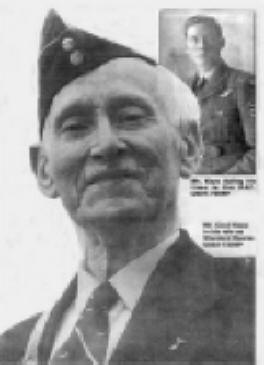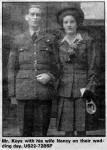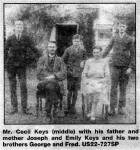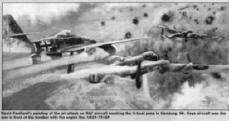
Sadness at death of Wings Appeal Organiser
 CECIL Keys, one of the best known faces in Lisburn's
ex-service circles, has passed away at ' the age of 89.
CECIL Keys, one of the best known faces in Lisburn's
ex-service circles, has passed away at ' the age of 89.
The Vice-President of the local branch of the Royal Air Forces Association, he was well known in his capacity as both
Honorary Branch Wings Appeal Organiser and Branch Standard Bearer.
He died peacefully at his home in Millbrook Walk oft Low Road after a short illness.
He is survived by his daughters Patricia, Hazel, Eunice, Joyce and Marina as well as his son Rodney and brothers George and Fred who are 92 and 85 years of age respectively.
 Mr
Keys' wife Nancy, a nurse from Plymouth whom he met while
serving in the RAF during the Second World War, passed away in
1975.
Mr
Keys' wife Nancy, a nurse from Plymouth whom he met while
serving in the RAF during the Second World War, passed away in
1975.
Mr. Keys came from a farming background and was the son of Joseph and Emily Keys of Aghavilly, Co. Armagh.
He helped to found the Armagh branch of the RAF Association and was an active and dedicated member of the Lisburn branch for many years including a period as Branch Chairman.
He worked tirelessly for the Battle of Britain Wings Appeal, not only in September but throughout the year.
In his capacity as Branch Standard Bearer he attended area conferences as well as the organisation's annual conference.
He was probably the oldest standard bearer in the Association and undertook his responsibilities with dignity and devotion.
He is remembered as someone whose loyalty, effort and inspired enthusiasm made him an outstanding example to his fellow standard bearers. Indeed. his work earned hire a major accolade in 1997 when he was awarded a Presidential Certificate.
 Mr.
Key's daughter Eunice Murphy paid a warm tribute to her father
on behalf of her whole family describing him as `kind, honest
and loving'.
Mr.
Key's daughter Eunice Murphy paid a warm tribute to her father
on behalf of her whole family describing him as `kind, honest
and loving'.
She also recalled how in his later years, he continued to keep himself active by cycling into the city centre every day.
"He loved gardening and the sunshine," she recalled.
"He was a committed, determined and untiring worker for the Royal Air Forces Association and he will be sorely missed.
"Not only by his colleagues and friends in Lisburn but by his many other friends in Northern Ireland, the rest of the United Kingdom and much further afield."
Wartime service included sell in special operations
 MR. Keys served as a Warrant Officer Wireless Operator during
World War II.
MR. Keys served as a Warrant Officer Wireless Operator during
World War II.
He worked primarily on Lancaster and Stirling bombers, including a period on special operations in North Africa with 624 Squadron.
He was tremendously proud of his aircrew connections and was an active member of the Northern Ireland branch of the Aircrew Association and the Number 624 Squadron Association.
His last operational mission before the end of hostilities was a raid on the Hamburg U-boat pens with 61 Squadron which was the subject of a famous painting by artist David Pentland.
It was during this mission the RAF found itself attacked by jet propelled Nazi aircraft.
Some years ago Mr. Keys explained what happened during this operation.
"We were flying in the usual 'gaggle' formation and the flak was heavy," he said.
"I took a quick look at the situation from the Astrodome and could see our escort of Mustangs far out to starboard but something was moving very fast indeed in the opposite direction on the port side.
"I knew at once it was one of the jet fighters the Germans had developed and were using in the Hamburg area.
"Our two gunners had already seen it but we were also aware our.303 calibre guns would be no match for the 0.5 shells from the German jet.
"I was searching the area directly behind us for another possible dash of the enemy jet when a Lancaster, about 100 yards behind us, suddenly put its nose down in a vertical dive.
"The jet had come in so fast they hadn't much hope of getting a hit.
"We were aware we had just missed getting the chop instead of the unfortunate crew just behind us. Indeed, our bomb aimer was hit by flak.
This raid on Hamburg took place around 9am in sunshine. The bombers were accompanied by American Mustangs because of their long range fuel tanks.
30/05/2003
